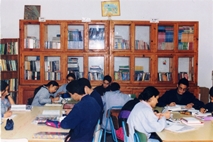الفائز لا يكتسح الآخرين في منافسة عادلة
منذ أيام طُرح موضوع المنافسة أثناء حديث دار بيني و بين مع صديق من قدماء المعهد. طبعاً بالنسبة ل"أناس مثلنا" تحتل المنافسة أهمية مطلقة في حياتنا منذ الصغر، إذ لمس الراشدون من حولنا موهبة خاصة لدينا و بالتالي طلبوا منا أن نتسابق مع غيرنا وأن يكون أدائنا مميّزاً في جميع المواد وفي كل الأوقات. امتُحنّا عدة مرات وطُلب منا في كل مرة أن نكون من الأوائل محلّياً ووطنيّا، وكنّا فعلا كذلك.

لكننا دفعنا ثمناً باهضاً لقاء هذا التفوق. سوف أتحدث عن نفسي و يهمني أن أعرف إذا كان آخرون يشاطروني الرأي. تجربتي مع المعهد النموذجي وإن كانت في مجملها إيجابية فإن مكوّن المنافسة فيها كان سلبياً إلى حد كبير و استلزم وقتاً طويلا وجهداً تواصل إلى أواسط العشرينات من عمري للتخلص من رواسب كرّستها "ثقافة النموذجي". من ضمن هذه الرواسب أذكر انعدام الثقة في الآخرين و ضرورة مقارنة نفسي مع الناس باستمرار والحاجة للانتصار وليس النجاح وحسب كي أشعر بالرضا عن نفسي. لكن أسوأ هذه الرواسب على الإطلاق يبقى رفض إمكانية الفشل.

كي نفهم لماذا وقع ترسيخ هذه القيم في المعهد علينا أن ننظر إلى طبيعة النظام السياسي في تونس آنذاك، إذ كان نظاماً مبنيّا على فرضية وجود مكان لفائز واحد أو لبضعة فائزين في أحسن الأحوال. أما الأغلبية الباقية فينعدم وجودها تماما بعد أن يكتسحها الفائز. هذا المبدأ لازال معمولاً به في السياسات العامة إلى يومنا هذا، ومنها سياسة التوجيه الجامعي الموجّهة نحو تلبية حاجات 15% من الناجحين في الباكالوريا، أي 7% فقط من مجموع المترشحين لهذه المناظرة. أما ال93% الباقون فمعظمهم يتركون الدراسة أو يوجّهون لجامعات لم يختاروها، وينتهي بهم الأمر إلى البطالة.
نظام كهذا النظام يفتقر للنجاعة ويكرّس التمييز والظلم، ففي تقسيم الأطفال إلى بضعة فائزين وأغلبية فاشلة تعدٍّ على حقهم في القبول والمرافقة أيّاً كان أداؤهم الدراسي، علاوةً على أنه يعيق تطورهم الفكري ويقلّل من ثقتهم بالنفس وبالآخرين ويشجعهم على ممارسة الغش ويجعلهم غير قادرين على العمل في مجموعة. تجدهم يفشلون كتلاميذ ويفشلون في المستقبل كمواطنين، ولعل في ذلك تفسيراً لنجاح التونسيين كمواطنين في الخارج أكثر من تونس نفسها.
أرجو أن لا يؤوّل كلامي على أنه رفض للمنافسة في المطلق فأنا من أشد المناصرين لمبدأ الاختيار على أساس الجدارة. لكن المنافسة المطلوبة في مجتمع كمجتمعنا هي منافسة تختبر الناس بصفة عامة والأطفال بصفة خاصة "مع" بعضهم البعض وليس "ضد" بعضهم البعض. نحتاج لبناء جيل جديد أفراده مستعدون لتبادل خبراتهم ومواهبهم و تحقيق أهداف مشتركة بالإضافة للأهداف الشخصية. كما نحتاج لاعتماد نمط جديد في التفكير في مفهوم التربية كي يكون كل طفل قادراً على إعطاء أفضل ما لديه دون أن يشعر بالنبذ والاضطهاد والخجل والخوف.
في كلمة نحتاج لنظام تربوي عادل، و طبعاً المسؤولية في تحقيقه ملقاة على عاتق الأساتذة أولاً.

طارق الشنيتي (باكالوريا 1997)
The winner does not have to take it all in a fair competition
At a recent discussion with a friend and fellow alumnus of the school the issue of competition came up. Of course competition for “people like us” has been a central component of our lives from very early on. As children we were perceived as gifted by the adults around us and therefore we were quickly immersed in rivalry and asked to perform well, in all subjects, all the time. We sat for various examinations and were consistently pushed to achieve the best results and to stand out locally and nationally. And we did.

But the cost was dear. I am not sure how other people feel about this and I would be very interested to read their opinions, but my own experience with competition as a pupil was rather unhappy even if my experience of high school as a whole was positive. It took me many years - in fact well into my twenties - to undo some of the wrong values that “pioneer life” made me believe in. Among these values were the mistrust of my peers, the obligation to persistently compare myself to others, the need to triumph to achieve a sense of fulfillment, and worst of all, the nonacceptance of failure as a possibility.

To understand why these values were promoted one has to look at the nature of the political system in Tunisia back then, a system founded on the assumption that there is space for only one winner or a few at best. The rest, the majority, simply cease to exist as the winner takes it all. This principle is reflected in state policies that are still in place today, including a university orientation scheme which caters for the needs of 15% of those who pass the Bac, that is barely 7% of the total number of candidates for this exam. The remaining 93% leave the education system or pursue university studies they have never chosen, and later become unemployed.
This system is inefficient, discriminatory and unfair. To divide children into winners and losers violates their right to be accepted and accompanied regardless of their performance. It hampers their intellectual development, lowers their self-esteem, reduces their trust in others, encourages them to cheat, and makes them unable to function in a group. It is a recipe for their future failure as citizens and this perhaps partly explains why many Tunisians thrive more abroad than at home.
Of course this is not to say that competition is a bad thing in principle and in fact I am a passionate advocate of meritocracy as a policy and a way of life. But the kind of competition that is needed in a society like ours is one in which people in general and children in particular are challenged ‘with’ one another, not ‘against’ each other. We need to raise a new generation of people who are willing to share their creative talent and to set up synergies. We also need to adopt a new way of thinking about the whole concept of education to get the best out of every child without making them feel rejected, bullied, ashamed or fearful.
In a word we need a fair education system, and needless to say, the onus is primarily on teachers to put it into practice.

Tarek Cheniti (Bac 1997)


Comments
تعليقات